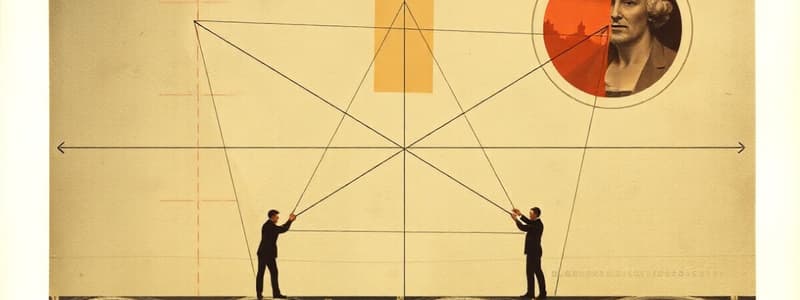Podcast
Questions and Answers
A box is resting on a table. Which statement best describes the forces acting on the box?
A box is resting on a table. Which statement best describes the forces acting on the box?
- Only the force of gravity acts on the box.
- There are no forces acting on the box since it is at rest.
- The force of gravity is balanced by the normal force from the table. (correct)
- The box experiences an unbalanced force, causing it to accelerate downwards.
Two people are pushing a car. One person applies a force of 200 N to the right, and the other applies a force of 150 N to the left. What is the net force on the car?
Two people are pushing a car. One person applies a force of 200 N to the right, and the other applies a force of 150 N to the left. What is the net force on the car?
- 50 N to the left
- 50 N to the right (correct)
- 350 N to the left
- 350 N to the right
Which of the following best describes a force diagram's primary purpose?
Which of the following best describes a force diagram's primary purpose?
- To calculate the mass of an object.
- To visually represent all forces acting on an object. (correct)
- To determine the object's color and texture.
- To measure the object's speed.
A book is sliding across a table and slowing down. Which of the following forces is most likely responsible for the book's deceleration?
A book is sliding across a table and slowing down. Which of the following forces is most likely responsible for the book's deceleration?
A rocket is accelerating upwards. The thrust force from the engines is 10,000 N, and the force of gravity is 8,000 N. What is the net force acting on the rocket?
A rocket is accelerating upwards. The thrust force from the engines is 10,000 N, and the force of gravity is 8,000 N. What is the net force acting on the rocket?
Flashcards
Unbalanced Forces
Unbalanced Forces
Forces that are not equal in magnitude or opposite in direction, causing a change in an object's motion.
Balanced Forces
Balanced Forces
Forces acting on an object that are equal in magnitude and opposite in direction, resulting in no change in motion.
Contact Forces
Contact Forces
Forces that require physical contact between objects, like friction or tension.
Force as a Vector
Force as a Vector
Signup and view all the flashcards
Free Body Diagram
Free Body Diagram
Signup and view all the flashcards
Study Notes
Balanced and Unbalanced Forces
- A force is a push or a pull that can cause an object to move, move faster or slower, stop moving, or change shape.
- Forces can be classified into contact forces (e.g., pushing a box) and non-contact forces (e.g., gravity).
- Forces are vector quantities, meaning they have both magnitude (strength) and direction.
Measuring Force
- The standard unit for measuring force is the Newton (N).
- A spring balance can be used to measure the magnitude of a force.
Force Diagrams
- Force diagrams (or free body diagrams) represent the forces acting on an object.
- Arrows on a force diagram show the magnitude and direction of each force acting on the object.
- Adding up all the forces gives the resultant force
- The resultant force helps find the state of motion of an object
Studying That Suits You
Use AI to generate personalized quizzes and flashcards to suit your learning preferences.



